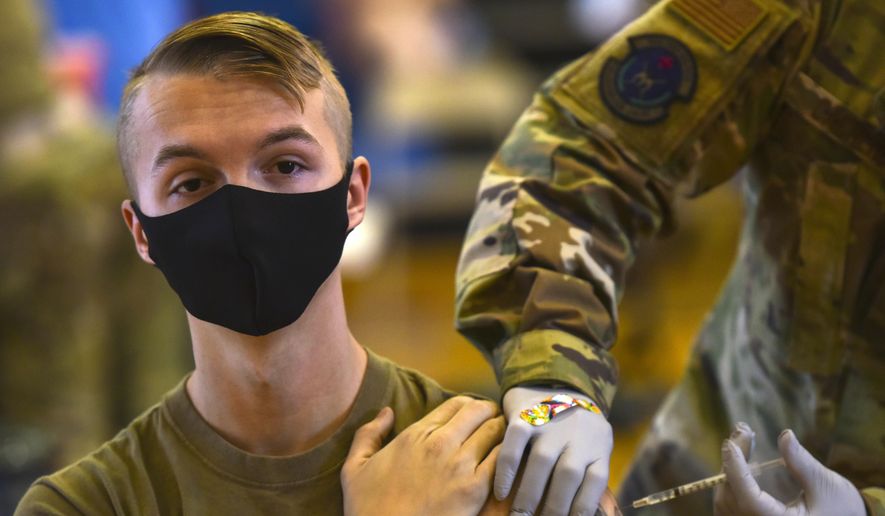Thousands of U.S. soldiers and sailors are refusing to receive the COVID-19 vaccination and at this point there’s not much more frustrated military commanders can do about it.
About one-third of all those offered the shot to protect against the deadly pandemic have declined to roll up their sleeves, Pentagon officials told a hearing of the House Armed Services Committee on Wednesday.
The military’s response to the threat posed by the coronavirus has been in the spotlight since the ill-fated voyage of the USS Theodore Roosevelt last year, when a raging infection forced the giant carrier to port and sparked a vicious fight in the chain of command over safety, discipline and readiness.
“We believe [getting] the vaccine is the right thing to do. It’s clearly safe for service members,” said Air Force Lt. Gen. Jeff Taliaferro, vice director for operations at the Joint Chiefs of Staff. “We need to continue to educate our force.”
They didn’t address what reasons the reluctant service members are giving for refusing but a number of myths and rumors have spread about the safety and efficacy of the current COVID-19 vaccines. Since vaccinations of the troops began last month, military leaders have worked to knock down suspicions in the ranks with a full-court public relations campaign — including having senior Pentagon officials get the shot.
But until the U.S. Food and Drug Administration gives its full approval of the drug — rather than the current emergency authorization — the Pentagon says it cannot legally require their personnel to take it.
“There are no circumstances where the [Department of Defense] has the legislative authority to do that,” said Brig. Gen. Paul Friedrichs, staff surgeon for the Joint Chiefs of Staff.
The Department of Defense has administered about 860,000 doses of the COVID-19 vaccine to the troops, with most of that number coming from the first dosage. Secretary of Defense Lloyd Austin has been vaccinated, having received the first round of shots prior to taking charge at the Pentagon and the second shortly after he was sworn in, chief Pentagon spokesman John Kirby said Wednesday.
“He did it after talking to his doctor and determining it was the right choice for him,” Mr. Kirby said.
Mr. Austin believes members of the military who may have questions about the vaccine should research the matter using reputable sources such as a trusted family physician or the Centers for Disease Control and Prevention, Mr. Kirby said.
“He recognizes that these are all individual decisions,” Mr. Kirby said.
U.S. military operations are continuing around the clock, even as a large number of personnel are declining the vaccine. Lt. Gen. Taliferro insisted the services have been “adaptive and resilient” since the worldwide pandemic struck.
“We’re fully capable of operating in a COVID environment,” he said. “The services and the combatant commands worked very hard over the last year. The addition of the vaccine should make us more capable.”
The military is collecting data on the acceptance rates within the ranks and Dr. Friedrichs said their data shows their experience mirrors that of other communities.
Rep. Salud Carbajal, California Democrat, expressed surprise that troops today can opt out of the COVID-19 vaccine. He compared it to his own experience in the U.S. Marine Corps when it was time for a vaccination.
“We just got in a line and they zapped us. Everybody got it,” Mr. Carbajal said.
In Norfolk, Virginia, about 6,000 sailors assigned to the Dwight D. Eisenhower Carrier Strike Group lined up for the COVID-19 vaccination prior to pulling away for their second deployment of the year. About 80% of the crews from the different ships in the strike group received the vaccine, officials said.
Two National Guardsmen died of complications from the virus earlier this month, bringing the total number of known active-military COVID-19 deaths to 19. Over 143,000 coronavirus cases have been reported in the military, the reserves and the National Guard, representing about 6% of the entire population.
The toll has been much heavier among military veterans: The Veterans Administration reported Wednesday that deaths to veterans and other patients in the system tied to COVID-19 had just passed the 10,000 mark in just 11 months.
• Mike Glenn can be reached at mglenn@washingtontimes.com.




Please read our comment policy before commenting.